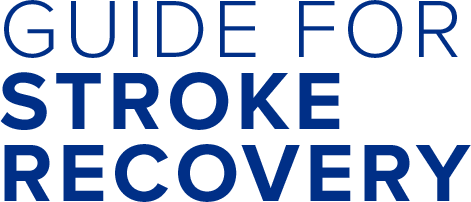For the person with stroke:
A caregiver is someone who provides help to another person who has an injury or illness. Your caregiver could be a family member, a friend, or someone who is paid to help you. Your caregiver is an important source of long-term support as you recover from stroke.
Your caregiver:
- helps you to be as independent as possible
- keeps you safe
- respects your dignity
- supports your quality of life

You may rely on your caregiver for certain things. For example, you may need your caregiver to help:
- with your personal care (for example, dressing or bathing)
- with daily activities (for example, laundry or cleaning)
- with completing tasks that you were responsible for before your stroke
It is important to recognize that your caregiver has had to make changes in their life. Although being a caregiver can be a very positive experience, it is normal for your caregiver to need some time to focus on their needs so they can stay healthy.
For the Caregiver
Being a caregiver is both hard and rewarding. You are providing much needed support to your loved one. You and your family are making major changes to your lives. It will take some time for everyone to adjust to a new routine.
It is normal for you to feel:
- Grief
- Anxiety
- Anger
- Frustration
- Sadness
- Fear
I am a caregiver for someone with stroke. What can help make my journey easier?
Many caregivers need information, support, and training to learn how to adapt to a new way of life. People who may help guide your journey include:
- Your loved one’s healthcare team. They can help teach you how to support your loved one’s needs.
- Peer support groups. It might be helpful to talk with others who know what you are going through. You can share stories and learn from others.
- Respite care. Accessing respite services can provide you with the break that you need. Respite Care is short-term, temporary relief for caregivers. It can range from a few hours by having someone ‘relieve’ the caregiver in their home, to a few weeks allowing the caregiver to have some time away while their loved one receives care in a facility.
Things you can do for yourself include:
- Take care of your daily needs (bathing, eating a healthy diet, staying hydrated, getting enough sleep, etc)
- Plan a break time every day
- Meet up with friends regularly
- Do an activity you enjoy
- Reach out for help (this could include things like homemaking, respite, etc)
What are some signs of caregiver burnout?
As a caregiver it can be easy to make your loved one the focus of your life. It is common for caregivers to let their own health suffer. Watch for the following signs.
- Muscle tension
- Body pain
- Being tired most of the time
- Trouble sleeping
- Stomach problems
- Trouble getting better after getting sick
- Old health problems getting worse
- Trouble focusing
- Trouble making decisions
- Feeling helpless or overwhelmed
- Feeling lonely
- Eating too much or too little
- Taking too much sleeping pills, other medicines or alcohol
- Being easily upset or annoyed by others
- Losing control physically or emotionally
- Accidentally neglecting or being rough with the person you are caring for
If you experience any of these signs, talk to your family doctor, family and/or friends. They can help you manage this. Asking for help is not a sign of weakness or your inability to cope. It is normal to need a break and focus on your needs.

Many people have written books about their experiences caring for a loved one after a stroke. You may find it helpful to read about their experience.
Here are a few examples:
- One Hundred Names for Love: A Stroke, a Marriage, and a Language of Healing, Diane Ackerman, 2011
- Stroke! A Daughter’s Story, Doris Thurston, 2006
- Lessons Learned: Stroke Recovery From a Caregiver’s Perspective, Berenice Kleinman, 2007
- Living with Stroke: A guide for patients and families, Richard Senelick, 2010
- Stroke Diaries, Olajide Williams, 2010
Having read the information in this section, consider the following:
For the person with stroke:
- Do I need and/or have a caregiver to help me in my day-to-day life?
- Is my caregiver able and willing to help me in my day-to-day life?
- Do I know the signs of when my caregiver needs a break from caring for me?
- Do my caregiver and I know where to go for help if we need it (for example: family, friends, community services, respite programs or support groups)?
- Do my caregiver and I know how to access resources and services that we need?
For the caregiver:
- Do I feel that I am managing well with looking after my loved one?
- Do I know how I can help my loved one to be more independent?
- If I need help, do I know how to access resources and services to support me?
- Do I know the signs of caregiver stress or burnout?
- Are there activities I enjoy that I want to continue but am unable to?
- Would I like to talk to someone about how I am feeling?
- Do I know how to find someone I can talk to if I need to?
Where to get more information, help and support:
March of Dimes Canada – Stroke Recovery Canada
1-888-540-6666
